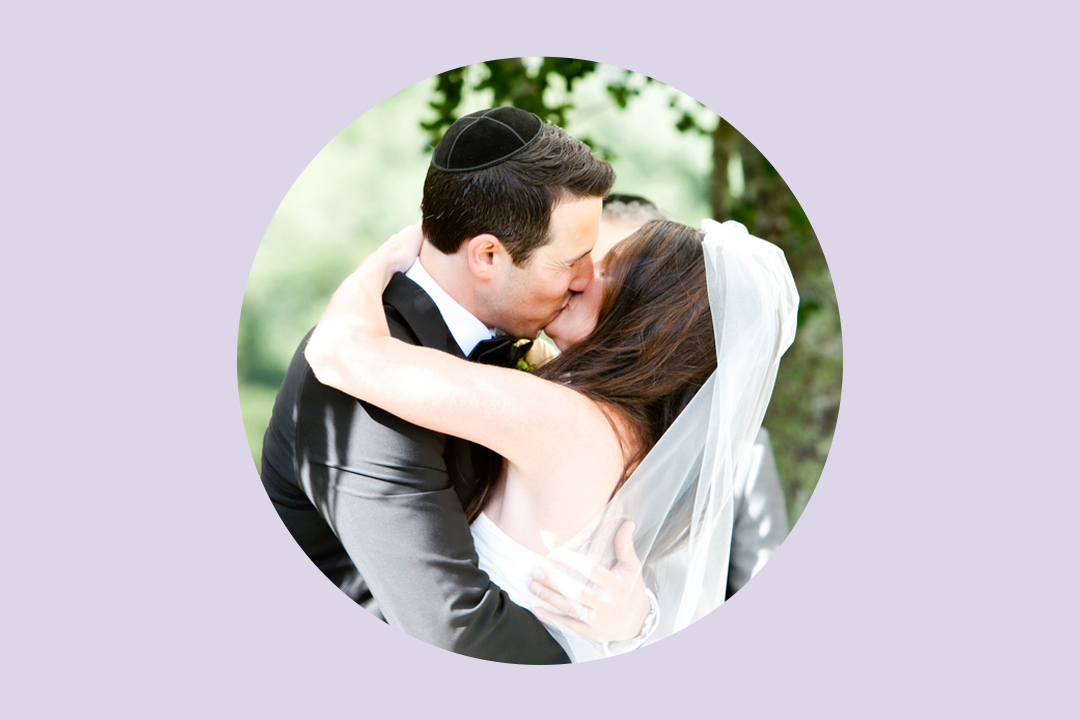What To Wear To A Jewish Wedding
Everything you need to know about dressing for a Jewish wedding you’ve been invited to.

The First Look ✨
- At Orthodox Jewish weddings, women tend to wear polished makeup, nails, and hair, though often with muted lipstick colors and subtle jewelry.
- When in doubt, men should default to a dark-colored suit, dress shirt, and tie. If a kippah, or Jewish religious head covering, is offered at the ceremony, it’s appropriate for both Jewish and non-Jewish men to accept.
- Women should default to a formal dress that covers their knees and shoulders (or comes with a formal jacket) and does not emphasize cleavage.
Dressing for a Jewish wedding is usually like dressing for any other wedding you might attend. The attire should be based on the formality of the event, as informed by the location, weather, and any other local factors. At formal Jewish weddings, for example, men usually wear suits and ties and women usually wear formal dress outfits.
However, there are definitely a few things to keep in mind when dressing for a Jewish wedding.
Modesty
For some traditional Jewish weddings, guests might take care to have their shoulders covered during the religious ceremony. Women wearing sleeveless dresses will often bring a shawl or other item with sleeves to wear during the ceremony.
In particularly traditional communities, guests will often ensure their outfits cover their shoulders, knees, and cleavage throughout the wedding, in keeping with the mores of the community. In the Orthodox Jewish world, women rarely wear pants at formal events, so a woman in a pants suit would stand out. For women who prefer to blend in, opt for a skirt or dress that covers the knees when dressing for an Orthodox Jewish wedding.
If you’re not sure what’s appropriate, don’t be afraid to ask your hosts. Many Jewish weddings do not have any expectations of more modest clothing, but if you are really unsure, play it safe and bring something to slip over your shoulders just in case.
Head Covering
At many Jewish weddings, male guests will often wear a kippah, or traditional head covering sometimes also called a yarmulke, during the ceremony. These are often given out or presented in gift baskets for guests. Women in Orthodox Jewish communities do not wear kippahs, though you might see some women wearing them in Conservative or Reform settings. A woman wedding guest would not be expected to wear a kippah, though if she sees many other women wearing one and would like to, she should feel welcome to wear one.
Non-Jewish male guests should feel free to pass on wearing a kippah without offense, but it is absolutely appropriate to wear one during the ceremony if they want.
In Orthodox Jewish weddings, as well as other Jewish weddings that are particularly traditional, it’s common for married women to cover their hair, especially during the ceremony. Some married women might cover their hair with a symbolic piece of lace, often offered alongside the kippot. However, married female guests shouldn’t feel pressured to cover their hair if this isn’t their own religious practice. Many guests will likely have uncovered hair, and this isn’t an issue for the vast majority of Orthodox Jewish weddings.
Consider Location and Community
Every Jewish wedding is different, so consider the community and location when considering what to wear. Is the wedding held in a synagogue? Beach? Backyard? Each of those locations might suggest a different expectation for attire. Communal norms will also inform the expectations. Dress codes in Israel, for example, are much less formal, so if the couple is Israeli there will likely be fewer men in ties. At Syrian or Persian Jewish weddings, however, women will often wear heels, and the dress code is likely to be more formal.
Jewish weddings that are hosted by Jewish families from India, Russia, Mexico, Morocco, and any other number of countries and cultures will likely have their own customs as well. Don’t worry too much about the details, however. As long as guests dress with appropriate enthusiasm for the occasion, they will fit right in.
Other Factors to Consider
Jewish weddings tend to be heavy on dancing, so bring comfortable shoes and expect to jump into the fray.
Otherwise, let your general wedding instincts guide your choices. There are rarely specific Jewish communal expectations around shoes, jewelry, makeup, or hairstyles. The only color that is off-limits is white, because it upstages the bride.
While certain bright color lipsticks and bold accessories might be out of place in a very insular Orthodox Jewish wedding, the typical guest will know far in advance. In such a situation, default to modest clothing and subtle makeup colors and jewelry, and cover up any visible tattoos if you want to blend in. But most guests already know everything they need to dress right for a Jewish wedding.
Because every Jewish community is a little different, the expectations for wedding guests often reflect the particular norms of the community in which the Jewish couple hosting the wedding is based.
